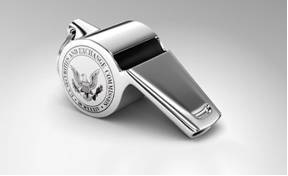SEC Charges yet Another Company for Violating Whistleblower Protection Rule

On September 29, the Securities and Exchange Commission (SEC) announced that New York-based investment adviser D. E. Shaw & Co. agreed to pay $10 million to settle charges of violating the SEC’s Whistleblower Protection Rule. It is the third SEC settlement in September for violating the rule, which prohibits a company from taking any steps to interfere with a whistleblower’s efforts or incentives to report potential securities fraud to the agency.
According to the SEC’s Order, D. E. Shaw violated the Whistleblower Protection Rule in two ways. First, the company required new employees to sign agreements that prohibited them from disclosing confidential information outside the company (unless authorized by the company or required by law). The proscription covered basically any information that could potentially cause the company harm, with no carve out for information shared with the SEC.
Second, the company required departing employees to sign releases affirming they had not filed any complaints with any governmental agency, department, or official. This was a condition to receiving severance benefits sometimes worth millions of dollars. Although D. E. Shaw circulated a firm-wide email in 2017 notifying employees they were allowed to communicate with regulators regarding possible violations, the company did not include similar whistleblower protection language in its employment agreements until 2019 and in its releases until 2023. All after the SEC initiated its investigation into this misbehavior.
The SEC’s action here follows two similar actions it took earlier in the month. On September 8, the agency slapped down Nebraska-based clean energy company Monolith Resources for forcing departing employees to waive their right to any whistleblower rewards for reporting fraud to the government. Less than two weeks later on September 19, the SEC settled charges against Dallas-based commercial real estate firm CBRE, Inc. for requiring departing employees to attest they had not filed a complaint against the company with any federal agency. The same violation for which the SEC went after D. E. Shaw.
With these actions, the SEC is making clear how much it values whistleblowers and the critical role they play in helping the agency with its fraud enforcement efforts. It also shows how strictly and broadly the SEC will enforce violations of the Whistleblower Protection Rule (21F-17), so that companies get the message not to take “any action to impede an individual from communicating directly with the Commission staff about a possible securities law violation.”
This comes from the agency’s most senior levels. In announcing the most recent settlement, SEC Director of Enforcement Gurbir S. Grewal was very direct in this messaging:
Entities employing confidentiality, separation, employment and other related agreements should take careful notice of today’s enforcement action. The Commission takes seriously the enforcement of whistleblower protections, and those drafting or using these types of agreements should take equally serious their obligations to ensure that they don’t impede whistleblowers from contacting the Commission.
Sheldon L. Pollock, Associate Director of the SEC’s New York Regional Office, echoed this strong sentiment:
Protected by federal law, whistleblowers play a significant role in uncovering fraud and other illegality in the securities markets, particularly with respect to registered entities regulated by the Commission. The SEC remains committed to ensuring their unfettered ability to provide information to further our investigations.
All this once again showing how determined the SEC is in safeguarding the various incentives and protections afforded individuals who voluntarily provide information to the SEC. One of the key incentives under the SEC Whistleblower Program is the right of successful whistleblowers to receive up to 30% of any government recovery. For some whistleblowers, this has amounted to awards of tens of millions, even hundreds of millions of dollars.
So if you think you may have information on potential securities violations and would like to speak with an experienced member of the Constantine Cannon whistleblower team, please do not hesitate to contact us.
Read More
- Securities Fraud
- SEC Whistleblower Program
- I Think I Have a Whistleblower Case
- Whistleblower FAQs
- Whistleblower Types
Tagged in: Securities Fraud, Whistleblower Protection Laws,